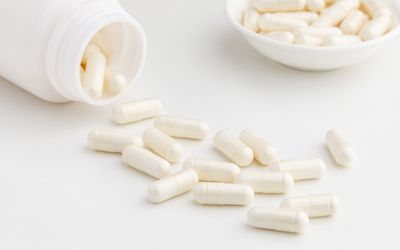Facts
Important glucosamine facts
Glucosamine is an approved treatment for arthritis in many countries around the world as it eases pain and inflammation, helps to repair damaged and ageing joints and gives a better range of movement.
Glucosamine occurs naturally in the body in high concentration in the joints and connective tissues. The body uses glucosamine to repair and maintain cartilage.
- Glucosamine provides relief to many arthritis sufferers
- Glucosamine may be even more effective than aspirin for relieving inflammation and pain and without the major gastrointestinal problems that aspirin has
- Glucosamine is also effective for dogs who have stiff joints
- Glucosamine is even more effective if it is taken with a chondroitin supplement at the same time
- Glucosamine is found in joints and connective tissue in the body
- Glucosamine is also found in shark cartilage
- Glucosamine is available in the following formats:Glucosamine sulphate (used in most studies), N-acetyl glucosamine, Glucosamine hydrochloride, Glucosamine/chondroitin sulfate combination (often contain manganese too)
Glucosamine works best with
Health
Glucosamine and health
- Osteoarthritis – several studies have shown that glucosamine significantly decreases joint pain and reduces inflammation associated with osteoarthritis. In particular, the NIH Glucosamine/Chondroitin Arthritis Intervention Trial (GAIT) showed that about 70% of people taking the chondroitin and glucosamine supplement experienced significant pain relief
People who wish to take an glucosamine supplement should talk to a medical professional before taking it.
Food sources
Food sources
Deficiency
Deficiency
Supplements
Types of glucosamine supplements
Glucosamine supplementation is available in the following ways:
- Tablet – glucosamine powder is compressed and formed into a tablet
- Capsules – glucosamine powder is added to capsules
- Powder – glucosamine is crushed and made into a powder
Glucosamine supplementation checklist
- Take glucosamine with food to minimise stomach upset
- Benefits of glucosamine are more noticeable when taken over a long period of time
- Tablets are a convenient and quick way of getting glucosamine
- Glucosamine powder can be taken if a more controlled or lower dose is required to start
Dosage
Glucosamine recommended dosage
Dosage of glucosamine depends on the condition that is being treated. A medical doctor and/or alternative health care provider can advise on individual cases – this information is provided as a guide only:
Lifestage | Age | Amount (per day) |
|---|---|---|
| INFANTS | 0-12mths | Not recommended |
| CHILDREN | 1-8yrs | Not recommended |
| CHILDREN | 9-18yrs | Not recommended |
| ADULTS | 19-50yrs | Osteoarthritis 500mg 3 times a day up to 3 months, then 300mg 3 times a day |
| SENIORS | 51+yrs | Osteoarthritis 500mg 3 times a day up to 3 months, then 300mg 3 times a day |
| PREGNANT | Not recommended | |
| LACTATING | Not recommended |
Toxicity
Overdosage, toxicity and cautions for glucosamine
Glucosamine does not normally cause many side effects, but the following have been reported:
- heartburn
- nausea
- headache
- drowsiness
- rash
Precautions
Precautions
- People on diuretic drugs – glucosamine may interact with certain diuretic drugs, nullifying their effects
Interactions
Interactions
References
References
- Clegg D, et al. Glucosamine, Chondroitin Sulfate, and the Two in Combination for Painful Knee Osteoarthritis. New England Journal of Medicine, 23 February 2006, 354:795-808
- Groff J L, Gropper SS, Hunt SM, Advanced Nutrition and Human Metabolism. West Publishing, USA, 1995
- Hughes R, Carr A. A randomized, double-blind, placebo-controlled trial of glucosamine sulphate as an analgesic in osteoarthritis of the knee. Rheumatology 2002; 41: 279-284
- H Müller-Fassbender, GL Bach, W Haase, LC Rovati, I Setnikar. Glucosamine sulphate compared to ibuprofen in osteoarthritis of the knee. Osteoarthritis and Cartilage 1994 2: 61-9
- Pavelká K, et al. Glucosamine Sulfate Use and Delay of Progression of Knee Osteoarthritis: A 3-Year, Randomized, Placebo-Controlled, Double-blind Study. Arch Intern Med. 2002;162:2113-2123
Last reviewed and updated: 6 May 2024


